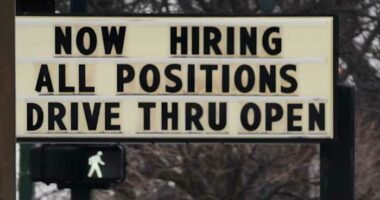Share this @internewscast.com

WASHINGTON – After an extended hiatus of nearly eight weeks, the House of Representatives is set to reconvene on Wednesday in the nation’s capital. The agenda? To potentially bring an end to the record-breaking federal government shutdown.
The House is preparing to deliberate on a bill aimed at reopening the government, a measure that successfully passed the Senate on Monday night. President Donald Trump hailed the bill as a “very big victory,” and it is anticipated to clear the Republican-majority House. However, the ongoing shutdown poses the threat of travel disruptions, which could complicate the voting process. Speaker Mike Johnson will likely require almost full attendance from Republican members to secure the bill’s passage.
The House has been absent from legislative duties since September 19, following the passage of a short-term funding measure that temporarily kept the government operational as the new fiscal year commenced in October. After this vote, Johnson sent lawmakers back to their districts, placing responsibility on the Senate to take further action, asserting that House Republicans had fulfilled their duties.
In the interim, Democrats have criticized Republicans for leaving Washington while federal employees went without pay, travelers faced airport slowdowns, and food assistance benefits lapsed. Responding to these criticisms, Johnson, a Republican from Louisiana, defended the decision, stating that members were engaged in crucial work within their districts.
Despite the upcoming vote, it is expected that a significant number of Democratic lawmakers will oppose the bill. Their primary contention is the absence of provisions to extend Affordable Care Act tax credits, which are set to expire at the end of the year, making healthcare coverage less affordable.
Democratic leader Hakeem Jeffries of New York expressed his party’s stance on Tuesday night, stating, “Our strong expectation is that Democrats will be strongly opposed,” in anticipation of the upcoming vote.
But Johnson said of the pending legislation that “our long national nightmare is finally coming to an end, and we’re grateful for that.”
“After 40 days of wandering in the wilderness and making the American people suffer needlessly, some Senate Democrats finally have stepped forward to end the pain,” Johnson said.
The compromise to end the shutdown
The measure that passed the Senate included buy-in from eight senators who broke ranks with the Democrats after reaching the conclusion that Republicans would not bend on using the measure to continue the expiring health care tax credits. Meanwhile, the shutdown’s toll was growing by the day. Wednesday marks Day 43 of the shutdown.
The compromise measure funds three bipartisan annual spending bills and extends the rest of government funding through Jan. 30. Republicans also promised to hold a vote to extend the health care subsidies by mid-December, but there is no guarantee of success.
“We had reached a point where I think a number of us believed that the shutdown had been very effective in raising the concern about health care,” said Democratic Sen. Jeanne Shaheen of New Hampshire. The promise for a future vote “gives us an opportunity to continue to address that going forward,” she said.
The legislation includes a reversal of the firing of federal workers by the Trump administration since the shutdown began. It also protects federal workers against further layoffs through January and guarantees they are paid once the shutdown is over. The full-year funding in the bill for the Agriculture Department means people who rely on key food assistance programs will see those benefits funded without threat of interruption through the rest of the budget year.
The package includes $203.5 million to boost security for lawmakers and an additional $28 million for the security of Supreme Court justices.
Democrats are also seizing on language that would give senators the opportunity to sue when a federal agency or employee searches their electronic records without notifying them. The language seems aimed at helping Republican lawmakers pursue damages if their phone records were analyzed by the FBI as part of an investigation into Trump’s efforts to overturn his 2020 election loss to Democrat Joe Biden.
“We’re going to tattoo that provision, just like we’re going to tattoo the Republican health care crisis, on the foreheads of every single House Republican who dares vote for this bill,” Jeffries said.
Many Democrats are calling the passage of the bill a mistake. Senate Democratic leader Chuck Schumer of New York, who received blowback from his party in March when he voted to keep the government open, said he could not “in good faith” support it after meeting with his caucus for more than two hours on Sunday.
Independent Sen. Bernie Sanders of Vermont, who caucuses with the Democrats, said giving up the fight was a “horrific mistake.” Sen. Chris Murphy, D-Conn., agreed, saying that voters who overwhelmingly supported Democrats in last week’s elections were urging them to “hold firm.”
Health care debate ahead
It’s unclear whether the two parties will find any common ground on the health care subsidies before the December vote in the Senate. Johnson has said he will not commit to bringing it up in his chamber.
Some Republicans have said they are open to extending the COVID-19 pandemic-era tax credits as premiums could skyrocket for millions of people, but they also want new limits on who can receive the subsidies. Some argue that the tax dollars for the plans should be routed through individuals.
Senate Appropriations Committee Chairwoman Susan Collins, R-Maine, said Monday that she’s supportive of extending the tax credits with changes, such as new income caps. Some Democrats have signaled they could be open to that idea.
“We do need to act by the end of the year, and that is exactly what the majority leader has promised,” Collins said.
Other Republicans, including Trump, have used the debate to renew their yearslong criticism of the law and called for it to be scrapped or overhauled.
In a possible preview, the Senate voted 47-53 along party lines Monday not to extend the subsidies for a year. Republicans allowed the vote as part of a separate deal with Democrats to speed up a final vote.
___
Associated Press writer Mary Clare Jalonick contributed to this report.
___
Follow the AP’s coverage of the federal government shutdown at https://apnews.com/hub/government-shutdown.
Copyright 2025 The Associated Press. All rights reserved. This material may not be published, broadcast, rewritten or redistributed without permission.











